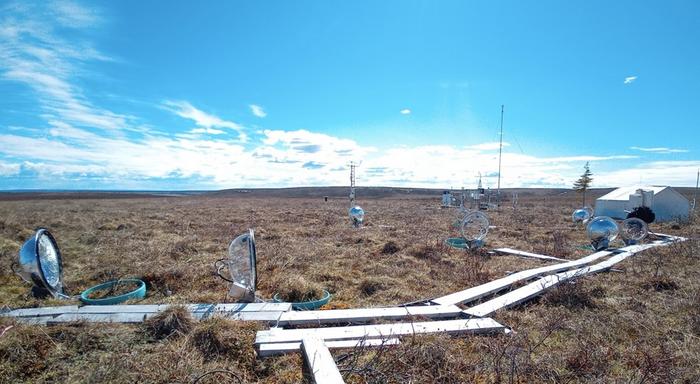Arctic wetlands are known emitters of the strong greenhouse gas methane (CH4). Well-drained soils on the other hand remove methane from the atmosphere. In the Arctic and boreal biomes, well drained upland soils with a high potential for atmospheric methane consumption cover more than 80% of the land area. Despite the large upland coverage and their potential importance for methane uptake, the underlying mechanisms, environmental controls and even the magnitude of Arctic soil methane uptake are poorly understood.

Credit: Carolina Voigt.
Arctic wetlands are known emitters of the strong greenhouse gas methane (CH4). Well-drained soils on the other hand remove methane from the atmosphere. In the Arctic and boreal biomes, well drained upland soils with a high potential for atmospheric methane consumption cover more than 80% of the land area. Despite the large upland coverage and their potential importance for methane uptake, the underlying mechanisms, environmental controls and even the magnitude of Arctic soil methane uptake are poorly understood.
A recent study led by researchers from the University of Eastern Finland and the University of Montreal finds that Arctic soil methane uptake may be larger than previously thought, and that methane uptake increases under dry conditions and with availability of labile carbon substrates. The article was published in Nature Climate Change – one of the top-level journals in natural sciences.
The study was primarily conducted at Trail Valley Creek, a tundra site in the Western Canadian Arctic. The authors used a unique experimental set-up consisting of 18 automated chambers for continuous measurements of methane fluxes. No other automated chamber system exists this far North in the Canadian Arctic, and only few exist above the Arctic circle globally, most of which are installed at methane-emitting sites.
The high-resolution measurements of methane uptake (more than 40 000 flux measurements) revealed previously unknown diel and seasonal dynamics in methane uptake: while methane uptake in early and peak summer was largest during the afternoons, coinciding with maximum soil temperature, methane uptake during late summer peaked during the night. Underlying biogeochemical mechanisms are complex, but the study shows that the strongest methane uptake coincided with peaks of ecosystem carbon dioxide (CO2) respiration. Complementing flux measurements at Trail Valley Creek with measurements at other sites spread across the Arctic in Canada and Finland showed that the availability of labile carbon substrates and nutrients may promote methane consumption in Arctic soils.
On a larger scale, these findings are highly relevant for estimating the current Arctic methane budget, and for predicting the future response of Arctic soil methane uptake to a changing climate. According to the study, high-latitude warming itself, occurring up to four times faster in the Arctic than the rest of the world, will promote atmospheric methane uptake to a lesser extent than the associated large-scale drying.
The study was carried out by an international team of researchers from Canada and Finland, and collaborators from the United States and Germany. The main funding sources for the study were the Academy of Finland, the Canada Foundation for Innovation project Changing Arctic Network, ArcticNet, and the Canada Research Chair and NSERC Discovery Grants programs. Field work was supported by Metsähallitus and the Aurora Research Institute.
Journal
Nature Climate Change
DOI
10.1038/s41558-023-01785-3
Article Title
Arctic soil methane sink increases with drier conditions and higher ecosystem respiration.
Article Publication Date
31-Aug-2023




